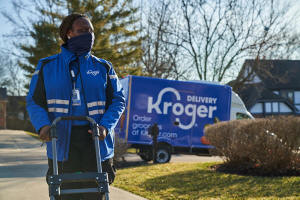What Walmart may gain from FTC's Kroger-Albertsons lawsuit
 Send a link to a friend
Send a link to a friend
 [February 28, 2024] By
Siddharth Cavale and Jessica DiNapoli [February 28, 2024] By
Siddharth Cavale and Jessica DiNapoli
NEW YORK (Reuters) - The Federal Trade Commission's bid to block grocer
Kroger's $25 billion acquisition of Albertsons could benefit Walmart, a
rival whose close relationships with suppliers already gives it a price
advantage over other chains, investors, consultants and analysts said.
Overall Walmart had a 24% share of the U.S. grocery market in 2022,
according to CFRA Research. Walmart intends to focus on keeping its
grocery prices as low as possible, a move that its executives said on an
earnings call helps Walmart continue to draw shoppers into its 4,700
U.S. stores.
One factor in Walmart's success has been its buying power with major
food and household staples suppliers, such as Procter & Gamble and
Conagra. Walmart alone already accounts for 15% of P&G's total annual
sales to retailers,and 28% of Conagra's.
The FTC challenge to Kroger's acquisition of Albertsons on antitrust
grounds "just makes Walmart stronger," said Burt Flickinger, managing
director at retail consulting firm Strategic Resource Group. If the deal
fails following the FTC's challenge, companies that make consumer
products like Tide detergent and Huggies diapers will continue to be
"beholden to Walmart," Flickinger said.
"The government is de facto helping an entrenched competitor" - Walmart
- "by not letting others get big enough to challenge them," said Walmart
investor David Klink, senior research analyst at Huntington Private
Bank, which also owns shares of Target and Amazon.
Bernstein analysts wrote in a note on Tuesday that they remain
"cautiously optimistic" the deal will close, although the FTC lawsuit
may delay completion by six months.

Just 10 chains - Walmart, Kroger, Costco, Albertsons, Sam's Club,
Publix, Ahold-Delhaize, Dollar General, Target and Aldi - controlled 60%
of the total U.S. grocery market in 2021, according to Bernstein
research.
The National Grocers Association, a trade group that represents smaller
independent food retailers and wholesalers, says that four big food
retailers - Walmart, Kroger, Costco and Albertsons - leverage market
share to "box out" suppliers, farmers, and ranchers, resulting in deals
that shift higher prices onto smaller stores.
The deal falling apart could be good for packaged food makersó if that
happensó because they would have a bigger pool of buyers, said Robert
Klaber, a portfolio manager at Parnassus Investments, which holds P&G
and Mondelez shares.
Store count is another area where Walmart may gain an advantage. Walmart
declined to comment.
[to top of second column] |

An undated handout photo shows a Kroger worker delivering groceries
in the U.S. obtained by Reuters on June 15, 2022. Kroger/Handout via
REUTERS

To counter concerns of overlapping stores in certain areas, Kroger
and Albertsons have agreed to sell 413 total stores to C&S Wholesale
Grocers, 104 of which are in Washington state, representing one
third of the total.
But Walmart operates only 52 Supercenters and four neighborhood
markets in Washington, according to a lawsuit filed by the state
Attorney General challenging the merger. Walmart, meanwhile, plans
to open 150 new stores over the next five years and renovate 650
others across 47 U.S. states and Puerto Rico this year. Walmart has
not disclosed all the locations it will open and renovate.
Generally, Walmart tends to operate four Walmart Supercenters for
every 25,000 to 30,000 people in a residential area. In California,
Walmart has only has one Supercenter for every 100,000 people,
indicating room for expansion there, Flickinger said.
The FTC lawsuit also poses a distraction, especially for Albertsons
employees facing an uncertain future following any acquisition by
Kroger. "We have seen it oftentimes. When the acquirer and the
target are in limbo, they lose a lot of talent," D.A. Davidson
analyst Michael Baker said.
Walmart's price gaps with competitors and curbside pickup and
delivery options is also attracting a lot more high-end customers
from rivals since the pandemic. Kroger and Albertsons will have to
"play catch-up," he said.
The prolonged uncertainty surrounding the merger could also stymie
Albertsons' progress on growth initiatives, while Walmart continues
to demonstrate strong sales, according to Arun Sundaram, an analyst
at CFRA Research. In their most recent quarterly performance, Kroger
posted a 0.6% drop in U.S. comparable sales, while Albertsons posted
a 2.9% increase and Walmart a 4% rise.
Kroger and Albertsons have cautioned that a blocked merger would
empower Amazon and Walmart.
"This (FTC) decision only strengthens larger, non-unionized
retailers like Walmart, Costco and Amazon by allowing them to
further increase their overwhelming and growing dominance of the
grocery industry," Kroger said in a statement on Monday.
(Reporting by Siddharth Cavale and Jessica DiNapoli in New York;
Editing by Nick Zieminski)
[© 2024 Thomson Reuters. All rights
reserved.]
This material may not be published,
broadcast, rewritten or redistributed.
Thompson Reuters is solely responsible for this content. |